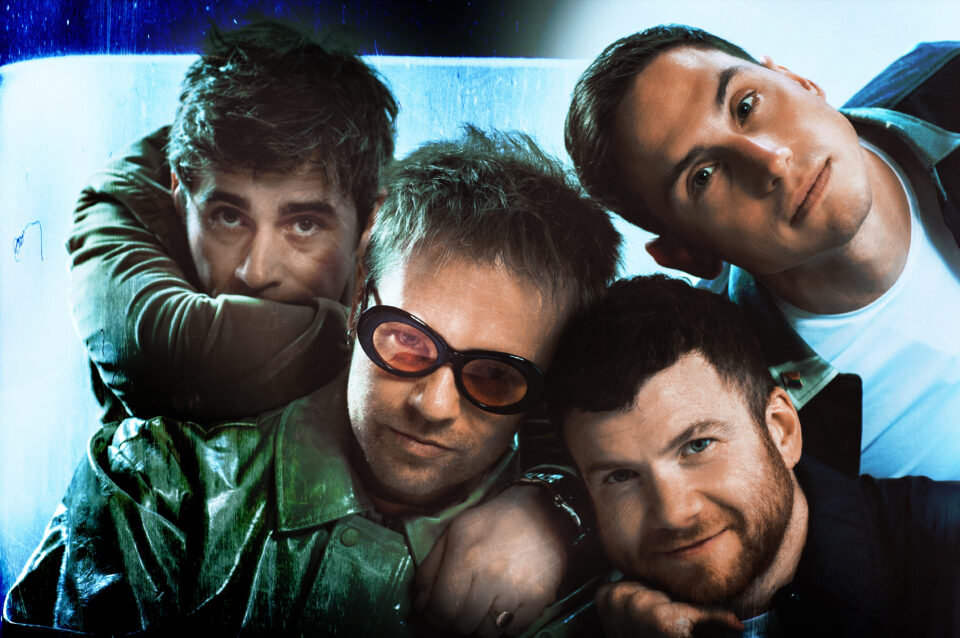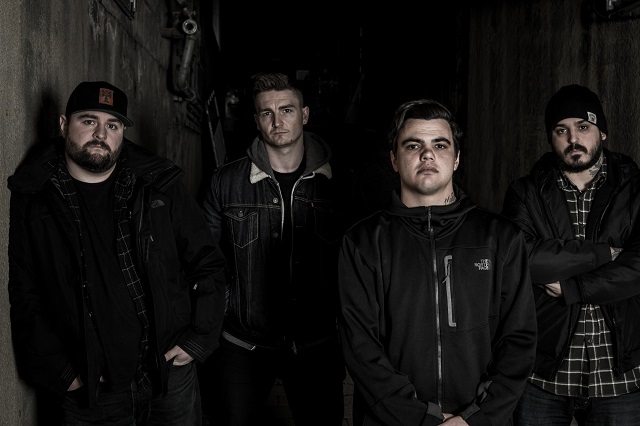Enter Shikari: ‘Our Drummer Rob Has Made It His Personal Challenge to Get Us to Play India’
The U.K. electronic/rock and metal band’s vocalist Rou Reynolds talks about their vibrant new album ‘A Kiss for the Whole World’

U.K. band Enter Shikari - Chris Batten, Rou Reynolds, Rory Clewlow and Rob Rolfe (from left to right). Photo: Jamie Waters
For all the trepidation thoughts that came out in music during the worst years of the pandemic, it was only apt that there were going to be bright, euphoric calls to happiness and being openhearted once things got better. U.K. act Enter Shikari’s new album A Kiss for the Whole World is squarely in that latter category, if you couldn’t already tell from the title alone.
Brandishing their honed style of electronic meets hardcore and rock, Enter Shikari’s seventh album has trademark warmth (“We’ll be dancing on the frontline/To symphony number 9” as Reynolds sings on the title track), sharp barbs (“She looked busy/Scrolling herself to death” on “Dead Wood”) and a few shattering realizations (“Disaster ain’t pre-determined/Any more than love and learning” on “It Hurts”) as well.
Beyond that, there are unmissable references weaved into the lyrics that reference their previous albums, from the breakout Take To the Skies from 2007 to 2017 pop-leaning full-length The Spark and Nothing Is True & Everything Is Possible from 2020. Sonically, the hardcore breakdowns and punk energy is very much a part of Enter Shikari’s latest, alongside glitchy production, bright synths as well as squelchy sub-bass that can make clubs quake.
With the release of A Kiss for the Whole World, the band – Reynolds, drummer Rob Rolfe, bassist Chris Batten and guitarist Rory Clewlow – have a chance to set things right considering Nothing Is True & Everything Is Possible was promoted in a wholly non-traditional way thanks to the restricted movement. “You put your heart and soul into an album, and then you can’t promote it, you can’t tour it, you can’t do anything. You can’t share it with people live. So yeah, it was just a very strange experience,” Reynolds says.
He goes on to admit that Enter Shikari “was just dead as far as we were concerned” at one point. The vocalist had gone a year and a half without writing or making any music until they began working on what became the new album. In an interview with Rolling Stone India, Reynolds talks about how they navigated the period of uncertainty even after resuming live shows, the themes of A Kiss for the Whole World and India. Excerpts:
Everyone seems better now knowing that the pandemic couldn’t stop things for too long. Was it a relief at how quickly things could turn back around but you still wonder, at what cost?
Rou Reynolds: That whole period was just a cocktail of emotions, as there was so much happening. I ended up basically not writing any music for a year and a half, which is something that’s never happened to me before, ever. I’ve written music constantly since I was, like, nine.
And I’ve kind of retrospectively realized that was because I didn’t have the experience of live music, I didn’t have the connection with people. I didn’t have that sense of purpose and the cyclical energy that you get when you’re playing music and meeting people. So that made the whole period very strange for me.
There was a lot of soul searching for me for that period, trying to work out who I am outside of the band and everything. At the time, it didn’t seem like it was going to be rectified or that we were going to find solutions quickly. It was just like this disconcerting, disorientating time.
But yeah, obviously, when we started playing shows again, there were so many different emotions, because we didn’t want to rush back to things, because we wanted everyone to be safe. We wanted everything to work as well as it could. There was a lot of talk about things going back to normal. We don’t really want things to go back to normal in terms of like, economics or climate change… we want action, we want progress. This was a great opportunity to take a big step forward. But of course, we haven’t seen much progress, unfortunately. So yeah, it was a very strange time, lots of different emotions.
A Kiss for the Whole World has been called a happier album in some ways, but does that mean it’s not as socially and politically conscious with its lyrics as previous records? Once you’ve set a standard, people might ask why you’re either addressing or not addressing certain topics in your songs?
I think even the stuff that is our most personal in terms of my lyrics is socially conscious because it says wider things about society. So for instance, even The Spark – which everyone says is the album that was all about personal things – uses my experience, my personal experience, to say bigger things about the world.
That album was all about vulnerability, and how we have tried to convince ourselves that we aren’t fragile creatures, when we are fragile creatures. You have all different animals that can do amazing things within 30 minutes of being born. Giraffes are up and running within like an hour; turtles are making their own way to the sea to go off. There’s all sorts of incredible ways that animals are very resilient, and very strong, straight away. We can’t even sit up! Our head has to be held… we’re very fragile creatures. And psychologically, that’s the case too.
But unfortunately, we’ve been sort of told – especially here in Britain, where we have the hangover from the Victorian period – you have to act a certain way, and men must be strong, and it’s so stupid, really, and so debilitating. So even that album basically explains why we have people like Donald Trump in the world, because that is a man who’s been told from his childhood that he cannot be fragile. Psychologically, he’s completely fucked up from it and he’s become this incredibly nasty person, because he’s just fragile. It’s just really sad.
Even the stuff that doesn’t seem overtly political, I think is political. With this album, there’s a bit of everything. There’s a lot of soul searching, there’s a lot of trying to work out who I am. But then, there’s the stuff like “It Hurts,” which talks about failure, and how I think we should reframe failure in society. I think the way we look at failure is actually quite debilitating, and not helpful at all. We try to avoid it, by any means necessary, we ridicule it. Whereas really, it’s the only proper way we learn. Maybe we shouldn’t not celebrate it, but it should be encouraged. If you’re failing, it means you’re trying something new.
One of the main reasons our society isn’t progressing is we’re not being bold enough. We’re not trying new things. We’re just kind of accepting that, ‘Oh, okay. We have capitalism. Oh, that must be the best system there is because all the other ones we’ve tried to failed.’ And we always compare our economic system to the ones that we have already whereas in fact, could we not just use our imagination, like we have all this amazing technology and all these ways we’re progressing in philosophy and sociology. Yet, we still can’t come up with new systems.
I think embracing failure and reframing it as something that is natural, something that is pivotal to our progress, something that is fruitful as well… that’s a really important thing. There are other tracks that are about power and powerlessness, they’re sort of political, I suppose. There’s little bits and pieces.
Enter Shikari have had a signature sound but I think when you started out, a few others were trying to do this too. What did you think of the “competition” back then?
I think I was just usually just inspired by it. We often felt a little bit lonely in terms of how the music we were making and how fearless it was, bringing these different genres together. For us, it was completely natural, because I grew up amongst different lots of different types of music. It wasn’t like this formulated, planned thing to make music that included these different genres. And that’s just how it came out that. I absorbed influences, and then it came out like that. So it was really nice when there were other artists and bands who were pushing things forward and trying out different collections of different sounds and different instrumentation. It was just emboldening when that happened.
Enter Shikari has come to South East Asia and nearby India before. Have there been any offers to play in India in the past? What have you heard about things out here?
India seems to be the most… we’ve had the most bad luck with getting to India. I think we’ve had two or maybe even three possibilities, like festival offers, and then it just hasn’t worked out. Or in terms of routing where we’re like, ‘We’ll try and route India in here.’ But it hasn’t worked out. It’s definitely somewhere that we would love to come.
Our drummer, particularly – Rob. It’s his own personal challenge, really, to get us to play India. He loves it so much. We would love to. We’ve had some good luck with South America recently, you know, places that we’ve never played before. We played Mexico City once, but now, I think we’re finally going to play some new places. And I think that’s the same across the world, really. And hopefully getting into Asia and getting into India. That would make our lives if we could have those experiences.
Stream the album here.







